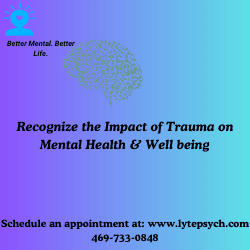Thu May 16 2024
The Impact of Trauma on Mental Health and Well- being at Lyte Psychiatry (Best Adults and Adolescents Psychiatrists and Therapists Near You), Affordable Therapists and Psychiatrists, Dallas, Fort Worth, TX

The Impact of Trauma on Mental Health and Well- being at Lyte Psychiatry (Best Adults and Adolescents Psychiatrists and Therapists Near You)
Trauma can have profound and long-lasting effects on an individual's mental health and overall well-being. It refers to the emotional response one has to an extremely negative event. While it's often associated with single-episode events, such as accidents or natural disasters, trauma can also stem from ongoing stressors, such as domestic violence, childhood neglect, or chronic exposure to war.
Psychological Impact of Trauma
The immediate psychological effects of trauma may include shock and denial, which can soon give way to other emotions such as sadness, anger, and fear. Over time, if these feelings are not addressed, they can develop into more serious mental health conditions, such as:
Post-Traumatic Stress Disorder (PTSD) is characterized by severe anxiety, flashbacks, uncontrollable thoughts about the event, and emotional numbness.
Depression: Persistent feelings of sadness and loss of interest that disrupt daily functioning.
Anxiety Disorders: Including generalized anxiety disorder, panic disorder, and specific phobias.
Physical Health Effects
Trauma can also lead to physical symptoms and conditions due to the chronic stress it imposes on the body. These may include:
Altered appetite
Gastrointestinal problems
Immune system dysfunction
Behavioral Changes of Trauma
Individuals dealing with unresolved trauma might adopt unhealthy behaviors as coping mechanisms. These can include:
Avoidant behavior
Eating disorders
Social and Relational Impact of Trauma
Trauma can affect relationships and social interactions. Trust issues, difficulty in forming attachments, and social withdrawal are common. This can lead to isolation and worsen the emotional toll of trauma.
Addressing the Impact of Trauma
Addressing the effects of trauma is crucial for recovery and long-term well-being. This may involve:
Medication: To manage symptoms of depression, anxiety, or PTSD.
Support Groups: Sharing experiences and coping strategies in a supportive environment can be beneficial.
Self-care Practices: Engaging in activities that promote relaxation and stress reduction, such as exercise, mindfulness, and hobbies.
Seek for Professional Help at Lyte Psychiatry (Affordable Therapist and Psychiatrist Near You)
For those impacted by trauma, professional help from specialized therapists and psychiatrists is essential. Services like those provided by Lyte Psychiatry offer access to affordable and specialized mental health care, helping individuals to recovery journeys and regain control over their mental health and well-being.
To Schedule an appointment. Click Here
To see our services. Click Here
Call us if you have questions at 469-733-0848
Frequently Asked Questions (FAQ)
Q: What are the signs that I might need help after experiencing trauma?
A: If you find yourself struggling with persistent sadness, anxiety, flashbacks, or other disturbances that affect your daily life, it might be time to seek professional help.
Q: How does therapy help with trauma?
A: Therapy can help you process the traumatic event, learn coping strategies, and gradually reduce your symptoms through structured support and techniques.
Q: Can trauma affect physical health?
A: Yes, trauma can lead to physical symptoms like chronic pain, sleep problems, and a weakened immune system, making comprehensive care essential.
Q: What should I do if someone I know is experiencing trauma?
A: Encourage them to seek professional help and offer your support. Being there for them can make a significant difference.